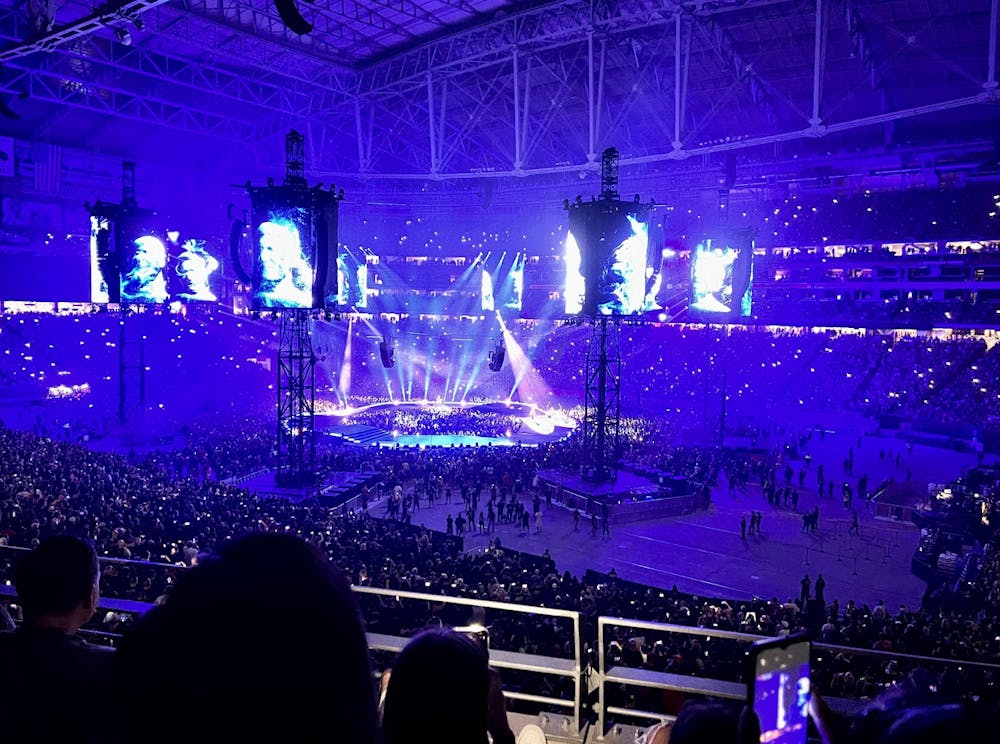Metallica is a band that needs no introduction. With a career spanning four decades, their impact on rock and metal music — and music in general — cannot be understated. Metallica continued their M72 Tour in Glendale’s State Farm Stadium this past weekend.
While all four of Metallica’s members shredded, sang and drummed their hearts out, Robert Trujillo and Lars Ulrich stood out for their performances. Playing bass and drums respectively, the legends gave life to the show. Trujillo’s stance and body language displayed just how dedicated he is to his craft, contorting his body into the vortex of his bass guitar. Ulrich’s drumming united the band with a powerful beat as they individually roamed around the oblong-shaped stage.
The stage’s shape was a focal point of the performance; it featured a circular space within the stage’s perimeter called the Snake Pit. Fans could purchase standing tickets for the Pit or could win an opportunity to stand in the Pit through a QR code handed out in line for Metallica’s weekend-long pop-up shop. The members wandered the stage at a seemingly random pace, sometimes playing in pairs or a cluster. Ulrich’s drum kit moved a few times, providing a moving focal point for the other three. The stage also benefited from eight towers of speakers and technicolor screens, providing live footage of the performance as well as curated media to accompany the music. The towers provided colored lighting as well, unifying the stadium in the tour’s aesthetic. During songs from the band’s most recent album, “72 Seasons,” yellow and black lights encompassed the stage.
As for the setlist, there was much to be desired. When singer James Hetfield asked the crowd to raise their hands if they were a first-time attendee, a large portion of the crowd responded as such. That being said, the setlist was very peculiar. Classics such as “Enter Sandman” and “Blackened” were nowhere to be found. Instead, most of the songs came from “72 Seasons” and Metallica’s self-titled album from 1991. Newer fans fond of the band’s more well-known hits were sure to be disappointed. The execution of the songs that the band performed was flawless, though not effortless. Hetfield appeared to be in physical pain when he was singing some of the set’s harder songs.
While the band succeeded in execution of all songs, a few stood out. “Orion,” “Fuel,” and “Fade to Black” elicited the most enthusiastic reactions from the crowd. “Orion,” a classic from Metallica’s 1986 album “Master Of Puppets,” is an entirely instrumental number. The song has not been played live as much as others from the record, but Hetfield and Hammett threw themselves into their performances. The crowd, largely indifferent for the rest of the set, erupted at the opening chords. As for “Fuel,” Hetfield refrained from singing the difficult vocals and instead stepped back to let the crowd sing for him. While not the band’s best rendition of the song, its fame compensated for other misjudgments on the setlist. Before Hetfield began the glorious intro of “Fade To Black,” he emphasized the importance of mental health and community. Both this message and the passion behind Hetfield’s playing gave the song a new vitality.
When the fourteenth song, “Seek and Destroy,” was finished, Hammett began to toss guitar picks into the Snake Pit. Moments later, Ulrich started lobbing black-and-white drumsticks at fans.
The stadium lights turned on, and the only sound was intermittent cheering from the floor. Each member of the band thanked the fans for a great show and posed for a few final shots of the stage. The show seemed to be ending, though the band had not played “Master of Puppets,” the M72 tour’s closer. When the band finally walked off stage, the stadium erupted in a cacophony of boos. I felt like the concert did not have a closing number, but rather ended abruptly in an anticlimactic manner.
It appeared as though the rest of the fans in attendance agreed. A man in my section of seats began to scream profanities and complaints addressed directly to the band. The crowd was safe and the energy among fans was of camaraderie, but the crowd turned against Metallica. The band’s stellar execution and performance were marred by a disjointed and incomplete stylist.
Hetfield’s apparent exertion can be explained by the band’s Instagram post on Saturday of a positive COVID-19 test, framed by Hetfield’s famously tattooed hand. The band rescheduled the second night of the Phoenix shows to Sept. 9. Two songs were cut from the performance —“Master of Puppets” and “The Day That Never Comes.” The band’s masterful performance was overshadowed by a poor setlist and strange pacing.

